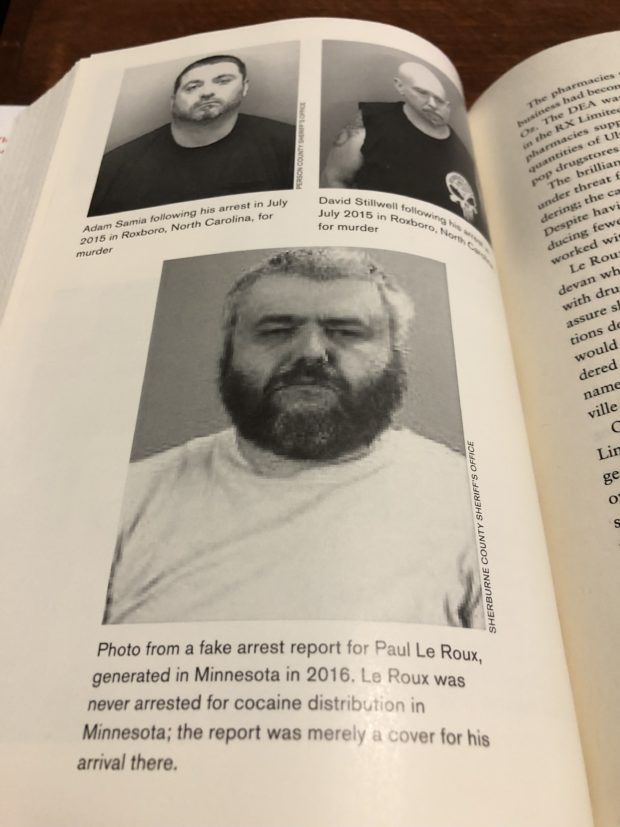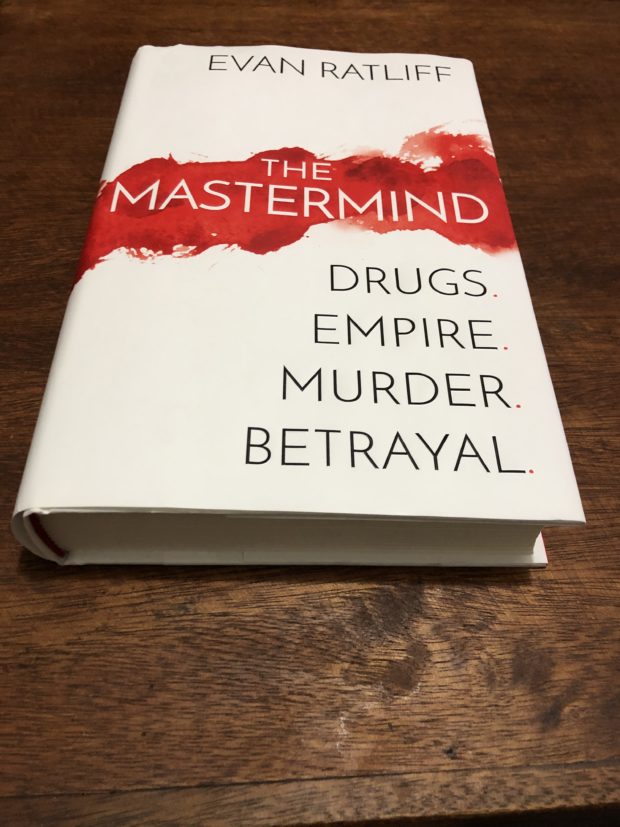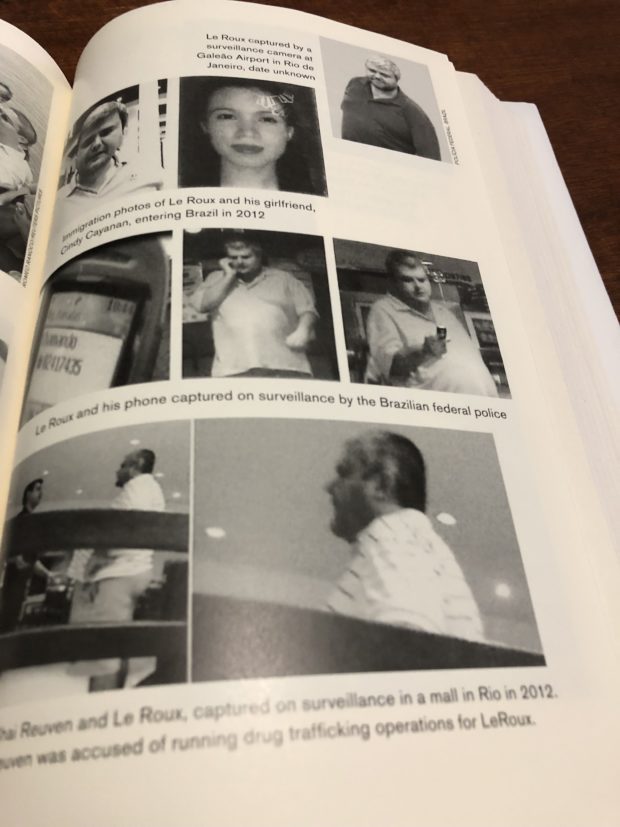Int’l drug crime boss had heyday in Philippines, says book
MANILA, Philippines – An international drug kingpin now awaiting sentencing in the United States had operated his crime network unmolested from his base in the Philippines by bribing high officials that included those from the national government and police, according to a new book that detailed the crime empire built by Paul Calder-Le Roux, a South African information technology (IT) genius who turned his internet drug distribution network into one of the world’s biggest underworld organization.
According to the book “The Mastermind” written by award-winning journalist Evan Ratfliff, Le Roux used the Philippines as his base of operations starting in 2007 because of the ease with which the crime boss could bribe his way through trouble.
Le Roux, according to the book, bought a house in the posh Dasmarinas Village in Makati City, leased space on the 14th floor of a banking building also in Makati and leased the penthouse of a high-end condominium in Salcedo Village also in Makati City.

A page showing images of Paul Le Roux and two of his hit men who operated with impunity in the Philippines. TONY BERGONIA
These were from where Le Roux gave out instructions to ship drugs into the Philippines and out for distribution to other countries, the book said.
These were also from where Le Roux, a Zimbabwean by birth, directed the smuggling of high-powered firearms, like antiaircraft guns and sniper rifles, which the crime boss used for security and to assassinate what he considered to be snitches in his organization or those he had accused of stealing his money, like Filipino real estate broker Catherine Lee in 2012.
Lee’s body had been found in Taytay, Rizal province and her murder had been connected to Le Roux. Two Americans involved in her killings, flown to Manila by Le Roux just to kill Lee, had been found guilty and sentenced to jail by a US court.
Her sin against Le Roux was to hand P50 million of the crime boss’ money, meant to buy land in Batangas province, to another real estate agent who took off with the money. Though not identified, the second real estate agent was believed to have been killed, too, on orders of Le Roux.
At the penthouse in Salcedo, a hitman called to a meeting by Le Roux was quoted as seeing a wall of servers in the crime boss’ inner office, showing how the IT genius had transformed the place into one of the centers of his IT-driven criminal organization that had branched out to Israel, Brazil, Papua New Guinea, the United States, Australia and several other countries, according to The Mastermind.
The book said that on the 14th floor of the banking building on Ayala Avenue, the main artery of the Philippines’ financial center, Le Roux operated a call center that took orders for prescription drugs from customers in the United States which were sold highly addictive pain killers illegally through the internet.
It was where Le Roux’s internet-based drug distribution company in the United States, called RX Limited, located its main call center.
Why Le Roux chose the Philippines as his base of operations, according to the book, could best be explained by a dialogue captured by a hidden camera, between Le Roux and a Colombian US Drug Enforcement Agency asset posing as a drug trafficker.
“You are not Filipino, why the Philippines?” asked the Colombian to Le Roux, according to the book’s quotation of the dialogue.
“Basically, as far as Asia goes, it’s the best shit hole we can find,” Le Roux had replied, the book said.
It was a dialogue for a deal that had Le Roux trading meth manufactured by his syndicate in the Philippines for cocaine from Colombia, according to the book.
“You are cooking your shit in the Philippines?” the Colombian asked.
At the book’s epilogue, Le Roux was further quoted as explaining during court testimony in the United States why he chose the Philippines as his base.
“He was unconcerned about the consequences in the Philippines,” the book said.
Then it quoted Le Roux during his testimony about operating from the Philippines: “I didn’t care who knew what, whether people (in the Philippines) knew the crimes were happening or not because I had the police in my payroll.”
“I was protected,” Le Roux was quoted as saying in court.
Discussing the Lee murder with a Philippine National Bureau of Investigation agent, the book explained why the NBI had taken on the Lee case.
“The ranks of local and national police in the Philippines are rife with corruption and the NBI had a better, though not spotless, reputation for integrity,” the book said.
“Contract murder was a thriving industry in the Philippines: having someone killed costs as little as 5,000 pesos, or around 100 dollars,” the book said in its prologue.
According to The Mastermind, Le Roux recruited mercenaries, some Americans and some Israelis, to provide him security in the Philippines.
With those mercenaries around, “Le Roux could now operate freely in the Philippines with little concern for legal repercussions,” the book said.
“There was no problem that he couldn’t buy his way out of, no law enforcement agency that couldn’t be captured, no intelligence that was out of reach,” the book quoted one associate of Le Roux as saying why the crime boss used the Philippines as his base.
To facilitate his arms smuggling, Le Roux opened up a gun shop, Red, White and Blue Arms with the help of Filipino associates.
Le Roux, according to the book, also had Filipino women brought to him to fulfill his sexual fantasies.
But one woman, the book, said refused to perform an unspecified sexual act on Le Roux and was beaten black and blue.
Quoting one of Le Roux’s mercenaries, the book said the woman turned out to be the daughter of a Philippine senator, who was not identified in the book.
Le Roux, The Mastermind said, “beat her up with a baseball bat.”
The woman, the mercenary was quoted, was the daughter of a senator which made it a “big, big deal.”
Although describing it as just a story that the mercenary confirmed from another source, the book said Le Roux invited the senator to his office and offered him “two to three million dollars” and to be in the crime boss’ payroll as compensation “for your baby girl.”
“That was Le Roux, his power in the Philippines,” the book further quoted the mercenary source.
“He had not the President, but up the chain,” the mercenary said, according to the book.
“Right hands of the President. Commanders, Generals. He had the Filipino staff working in the US Embassy on the payroll,” the mercenary continued, according to the book.
It explained why Le Roux operated with impunity in the Philippines, even having those he wanted to be killed shot in front of a crowded bar, or a road in the tourist area of Subic, or, in the Catherine Lee’s case, while inside a Toyota Innova in Batangas province.
At the book’s epilogue, its author, Ratliff, said he wondered how Le Roux would have operated under the administration of President Rodrigo Duterte, who had launched a brutal campaign against drugs and criminality that had already claimed the lives of thousands of people.
“One source connected to the Manila underworld told me he’d talked to people at the highest levels of the (drug) cartels now active in the country, who said that the killing campaign was targeted only at addicts and low-level dealers, leaving the higher-ups, who knew how to pay for protection, untouched,” Ratliff wrote.
“The drug business, he said, was booming,” he continued. “They said ‘we’re sending in more (drugs).’ They’re stockpiling it,” he added.
“So you killed how many thousands of people? There’s no dent in it (the drug trade in the Philippines),” Ratliff wrote, quoting his underworld source.
















